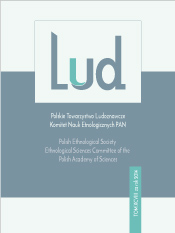Narracje nadziei, ambiwalencje doświadczenia. Opowieści o życiu w czasie remisji raka piersi w jednym z polsk ich stowarzyszeń samopomocowych
Narrations of Hope, Ambivalent of Experiences. Stories About Life in Breast Cancer Remission in One of Polish Self-Help Associations
Author(s): Marcin Lubaś, Katarzyna SłabySubject(s): Anthropology, Sociology
Published by: Polskie Towarzystwo Ludoznawcze
Keywords: agency; biomedicine; biomedicalization; bio-sociality; breast cancer experience; remission experience; self-help group; illness and remission narratives; narrative practice; remission society
Summary/Abstract: This paper scrutinizes fifteen life stories told by volunteer activists from a breast cancer support group operating in southern Poland; highlighted is life in remission. The analysis is based on ethnographic materials (i.e., in-depth interviews, participant observation) gathered during fieldwork conducted by one of the authors. We especially focus on variation and ambiguity in these remission narratives. Drawing on Arthur Frank’s typology of illness narratives, we distinguish two strains: the “restitution” and the “quest” narratives (which are combined by our interlocutors). The former is a construct which presumes that cancer is a transitory physical condition which can be successfully cured, taking post-treatment patients back to the initial state of health. This type of narrative constitutes a modus operandi for the support group whose essential task is to instill hope in women suffering from breast cancer. The latter narrative type seems more complex and more sensitive to the particularities and precariousness of the embodied biography. It underscores a quest for establishing meaningful relationships in a life affected by multiple defeats. Considering the remission narratives analyzed herein, the authors of this paper conclude that the system and apparatus of biomedicine do influence, but do not wholly determine the ways in which the breast cancer experience is narrativized. The restitution narratives dominate in various realms of group life while the space for quest narratives is secluded. Nonetheless, the quest narratives embody the women’s agency. They break with dominant restitution narratives as they address painful issues of health and gender, identity loss, cancer recurrence, sense of loneliness – the topics that are excluded from the restitution narratives. These quest narratives are ambiguous in their meaning and relegated only to private conversations and interviews. This text aims at contributing to a discussion about the shifts in the social and political organization and experience of remission life as a result of new technological developments and their global expansion in the last decades. Inasmuch as cancer experiences were relegated to the private sphere of patients in remission, today biosocial communities emerge in which these experiences are narrativized. Such autobiographies are characterized by ambiguity and an embodied diversity of narrative constructions. The quest narratives of post-mastectomy women discloses agency although they are not intended to bring radical change in the way cancer experience and remission life is publicly narrativized.
Journal: LUD
- Issue Year: 101/2017
- Issue No: 1
- Page Range: 401-421
- Page Count: 21
- Language: Polish

